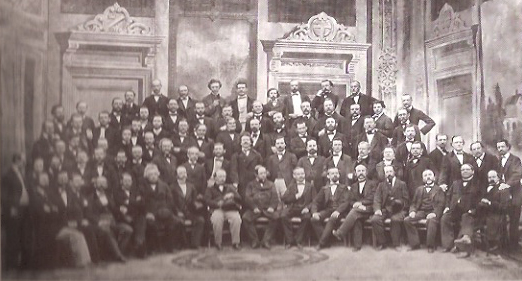Marching in the New Year
January 5, 2020
THE NEW YEAR is here and that means it’s the time of year to reprimand one of Europe’s most famous arts institutions: the Vienna Philharmonic, known for its famous New Year’s Day concerts.
This year, the philharmonic got hit from two directions: on one side, for long playing a particular arrangement of Johann Strauss’s famous Radetzky March. The arrangement was written by a member of the National Socialist Party. Leopold Weninger wrote it in 1914, decades before the National Socialists existed. Despite the immense, worldwide popularity of the march, which always ended the New Year’s concert, the orchestra’s most famous annual event, the philharmonic for the first time this year replaced it with another, less rousing arrangement. You can see the former version, with all that disgusting, patriotic clapping, in the video above. Unfortunately, I don’t have a clip of the new one.
That the famous orchestra prefer to disassociate itself from Nazism by undermining a jubilant celebration that has nothing to do with Nazism is not unreasonable, I suppose, but then could we have some balance please?
For instance, could the orchestra stop performing the works of Russian composer Sergei Prokofiev and other artists who had connections with the Soviet government, under which tens of millions of innocent people were sent to their deaths and killed in deliberate famines? Prokofiev voluntarily returned to Soviet Russia after living in the West for two decades; he wrote music meant to boost the morale of the Soviet army; won Stalin prizes and in 1937 composed a cantata celebrating the 20th anniversary of the Bolshevik revolution, featuring musical settings of texts by Stalin, Marx and Lenin.
Now I don’t believe Prokofiev’s beautiful compositions should be banished, but if musical works are to be judged by the political connections of musicians, then we have to roll up our sleeves and get to work, not just with connections to Nazism, but with connections to Soviet Communism, which killed far more people and is still alive today. (We hear far less about Soviet atrocities. Is that because they were so often committed under Semitic leadership?)
The Vienna Philharmonic was also scolded, as it has been many times, for having once been an all-male ensemble. The New York Times, to its credit, admits in this year’s critical piece that women were not excluded from performing classical music in the last three centuries.
For the most part, however, women performed in private, not in public, except in all-female ensembles ….
Yes, that’s very true, and one could even say that through their informal role, women performed more than men and did more to promote classical music. However, Farah Nayeri, author of The Times piece, trivializes the reason for the exclusion from orchestras:
Entire sections of the orchestra remained male because their instruments were considered unladylike.
The cello was deemed indecorous because it had to be placed between a player’s legs. Flutes and horns were thought to make a woman’s face look funny; percussion instruments were viewed as exclusively male.
That’s ridiculous. Women do look undignified with a cello between their legs, but professional orchestras were entirely or primarily male because men had the duty to financially support their families, a burden which women did not have to the same degree. The main thing that distinguished the professional orchestras from the private groups in which women played was that the musicians were paid, often enough to support a family.
Women are now part of the Vienna Philharmonic. And we live in a world where the family struggles far more. The point never was that women were inferior musicians. Eventually, the arts decline, as does civilization in general, when the family does. If you read through the lives of famous musicians and composers, you will find that many of them were inspired by mothers who loved music. The burden of proof rests with the believers in equality. No society has produced great art without great sacrifices — and one of those sacrifices is female success in the world, rather than the home.

Yikes! The horror! An all-male Vienna Philharmonic, back in the ages when women were hated even though men spent all their working lives supporting them.
— Comments —
Joseph A. writes:
Here in Cincinnati, we have our May Festival (and chorus) and the Cincinnati Symphony Orchestra thanks to the energy and organizational genius of 19th-century, upper class ladies who wanted their city to excel in the arts (including esteemed women such as Nellie Taft and Maria Longworth Nichols Storer). The association that created the symphony originally had an all-female board. We shouldn’t be surprised. The main intellectual and artistic life in France was cultivated — perhaps we should say nursed — by women for centuries. Women have always been instrumental in the blossoming of civilization.
Laura writes:
What an outrageous lie, that women were excluded!
I’m not saying there should be no professional women musicians, but the idea of equality is based on false premises and the whole project of achieving equal representation today is not a sign of progress, but a sign of steep cultural decline.
We wouldn’t have our orchestras if it weren’t for women like Nettie Snyder (St. Paul Symphony), Ima Hogg (Houston Symphony Orchestra), Alice Byrnes (National Symphony) and Frances Anne Wister (Philadelphia Orchestra).
According to Ralph P. Locke and Cyrilla Barr, patronage of orchestras was a “female-centered cultural process.”

